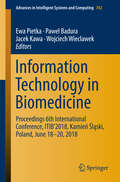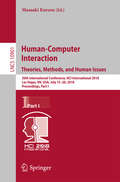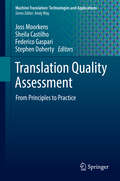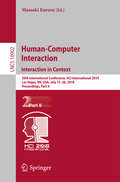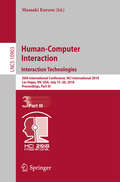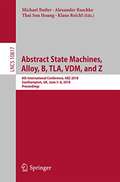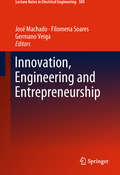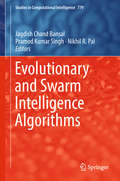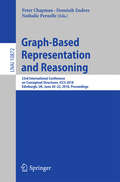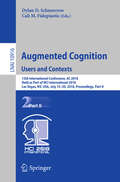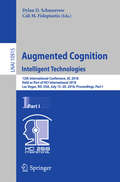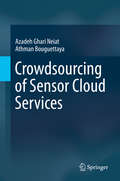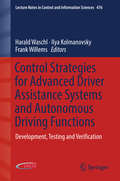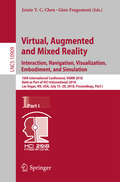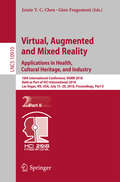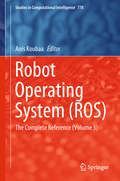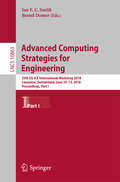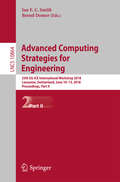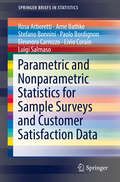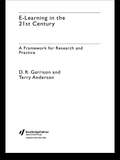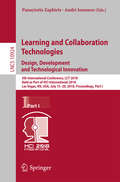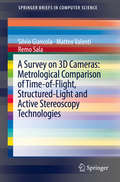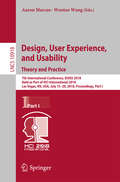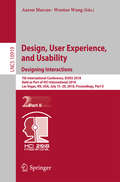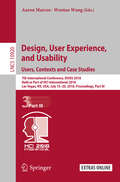- Table View
- List View
Information Technology in Biomedicine: Proceedings 6th International Conference, ITIB’2018, Kamień Śląski, Poland, June 18–20, 2018 (Advances in Intelligent Systems and Computing #762)
by Ewa Pietka Pawel Badura Jacek Kawa Wojciech WieclawekITiB’2018 is the 6th Conference on Information Technology in Biomedicine, hosted every two years by the Department of Informatics & Medical Devices, Faculty of Biomedical Engineering, Silesian University of Technology. The Conference is organized under the auspices of the Committee on Biocybernetics and Biomedical Engineering of the Polish Academy of Sciences. The meeting has become an established event that helps to address the demand for fast and reliable technologies capable of processing data and delivering results in a user-friendly, timely and mobile manner. Many of these areas are recognized as research and development frontiers in employing new technology in the clinical setting. Technological assistance can be found in prevention, diagnosis, treatment, and rehabilitation alike. Homecare support for any type of disability may improve standard of living and make people’s lives safer and more comfortable. The book includes the following sections: Ø Image Processing Ø Multimodal Imaging and Computer-aided Surgery Ø Computer-aided Diagnosis Ø Signal Processing and Medical Devices Ø Bioinformatics Ø Modelling & Simulation Ø Analytics in Action on the SAS Platform Ø Assistive Technologies and Affective Computing (ATAC)
Human-Computer Interaction. Theories, Methods, and Human Issues: 20th International Conference, HCI International 2018, Las Vegas, NV, USA, July 15–20, 2018, Proceedings, Part I (Lecture Notes in Computer Science #10901)
by Masaaki KurosuThe 3 volume-set LNCS 10901, 10902 + 10903 constitutes the refereed proceedings of the 20th International Conference on Human-Computer Interaction, HCI 2018, which took place in Las Vegas, Nevada, in July 2018. The total of 1171 papers and 160 posters included in the 30 HCII 2018 proceedings volumes was carefully reviewed and selected from 4346 submissions. HCI 2018 includes a total of 145 papers; they were organized in topical sections named: Part I: HCI theories, methods and tools; perception and psychological issues in HCI; emotion and attention recognition; security, privacy and ethics in HCI. Part II: HCI in medicine; HCI for health and wellbeing; HCI in cultural heritage; HCI in complex environments; mobile and wearable HCI. Part III: input techniques and devices; speech-based interfaces and chatbots; gesture, motion and eye-tracking based interaction; games and gamification.
Translation Quality Assessment: From Principles to Practice (Machine Translation: Technologies and Applications #1)
by Joss Moorkens Sheila Castilho Federico Gaspari Stephen DohertyThis is the first volume that brings together research and practice from academic and industry settings and a combination of human and machine translation evaluation. Its comprehensive collection of papers by leading experts in human and machine translation quality and evaluation who situate current developments and chart future trends fills a clear gap in the literature. This is critical to the successful integration of translation technologies in the industry today, where the lines between human and machine are becoming increasingly blurred by technology: this affects the whole translation landscape, from students and trainers to project managers and professionals, including in-house and freelance translators, as well as, of course, translation scholars and researchers. The editors have broad experience in translation quality evaluation research, including investigations into professional practice with qualitative and quantitative studies, and the contributors are leading experts in their respective fields, providing a unique set of complementary perspectives on human and machine translation quality and evaluation, combining theoretical and applied approaches.
Human-Computer Interaction. Interaction in Context: 20th International Conference, HCI International 2018, Las Vegas, NV, USA, July 15–20, 2018, Proceedings, Part II (Lecture Notes in Computer Science #10902)
by Masaaki KurosuThe 3 volume-set LNCS 10901, 10902 + 10903 constitutes the refereed proceedings of the 20th International Conference on Human-Computer Interaction, HCI 2018, which took place in Las Vegas, Nevada, in July 2018. The total of 1171 papers and 160 posters included in the 30 HCII 2018 proceedings volumes was carefully reviewed and selected from 4346 submissions. HCI 2018 includes a total of 145 papers; they were organized in topical sections named: Part I: HCI theories, methods and tools; perception and psychological issues in HCI; emotion and attention recognition; security, privacy and ethics in HCI. Part II: HCI in medicine; HCI for health and wellbeing; HCI in cultural heritage; HCI in complex environments; mobile and wearable HCI. Part III: input techniques and devices; speech-based interfaces and chatbots; gesture, motion and eye-tracking based interaction; games and gamification.
Human-Computer Interaction. Interaction Technologies: 20th International Conference, HCI International 2018, Las Vegas, NV, USA, July 15–20, 2018, Proceedings, Part III (Lecture Notes in Computer Science #10903)
by Masaaki KurosuThe 3 volume-set LNCS 10901, 10902 + 10903 constitutes the refereed proceedings of the 20th International Conference on Human-Computer Interaction, HCI 2018, which took place in Las Vegas, Nevada, in July 2018. The total of 1171 papers and 160 posters included in the 30 HCII 2018 proceedings volumes was carefully reviewed and selected from 4346 submissions. HCI 2018 includes a total of 145 papers; they were organized in topical sections named: Part I: HCI theories, methods and tools; perception and psychological issues in HCI; emotion and attention recognition; security, privacy and ethics in HCI. Part II: HCI in medicine; HCI for health and wellbeing; HCI in cultural heritage; HCI in complex environments; mobile and wearable HCI. Part III: input techniques and devices; speech-based interfaces and chatbots; gesture, motion and eye-tracking based interaction; games and gamification.
Abstract State Machines, Alloy, B, TLA, VDM, and Z: 5th International Conference, Abz 2016, Linz, Austria, May 23-27, 2016, Proceedings (Lecture Notes in Computer Science #9675)
by Michael Butler Atif Mashkoor Miklos Biro Laus-Dieter ScheweThis book constitutes the refereed proceedings of the 5th International Conference on Abstract State Machines, Alloy, B, TLA, VDM, and Z, ABZ 2016, held in Linz, Austria, in May 2016. <P><P> The 17 full and 15 short papers presented in this volume were carefully reviewed and selected from 61 submissions. They record the latest research developments in state-based formal methods Abstract State Machines, Alloy, B, Circus, Event-B, TLS+, VDM and Z.
Innovation, Engineering and Entrepreneurship (Lecture Notes in Electrical Engineering #505)
by José Machado Filomena Soares Germano VeigaThis book presents endeavors to join synergies in order to create added value for society, using the latest scientific knowledge to boost technology transfer from academia to industry. It potentiates the foundations for the creation of knowledge- and entrepreneurial cooperation networks involving engineering, innovation, and entrepreneurship stakeholders. The Regional HELIX 2018 conference was organized at the University of Minho’s School of Engineering by the MEtRICs and Algoritmi Research Centers, and took place in Guimarães, Portugal, from June 27th to 29th, 2018. After a rigorous peer-review process, 160 were accepted for publication, covering a wide range of topics, including Control, Automation and Robotics; Mechatronics Design, Medical Devices and Wellbeing; Cyber-Physical Systems, IoT and Industry 4.0; Innovations in Industrial Context and Advanced Manufacturing; New Trends in Mechanical Systems Development; Advanced Materials and Innovative Applications; Waste to Energy and Sustainable Environment; Operational Research and Industrial Mathematics; Innovation and Collaborative Arrangements; Entrepreneurship and Internationalization; and Oriented Education for Innovation, Engineering and/or Entrepreneurship.
Evolutionary and Swarm Intelligence Algorithms (Studies in Computational Intelligence #779)
by Jagdish Chand Bansal Pramod Kumar Singh Nikhil R. PalThis book is a delight for academics, researchers and professionals working in evolutionary and swarm computing, computational intelligence, machine learning and engineering design, as well as search and optimization in general. It provides an introduction to the design and development of a number of popular and recent swarm and evolutionary algorithms with a focus on their applications in engineering problems in diverse domains. The topics discussed include particle swarm optimization, the artificial bee colony algorithm, Spider Monkey optimization algorithm, genetic algorithms, constrained multi-objective evolutionary algorithms, genetic programming, and evolutionary fuzzy systems. A friendly and informative treatment of the topics makes this book an ideal reference for beginners and those with experience alike.
Graph-Based Representation and Reasoning: 23rd International Conference on Conceptual Structures, ICCS 2018, Edinburgh, UK, June 20-22, 2018, Proceedings (Lecture Notes in Computer Science #10872)
by Peter Chapman Dominik Endres Nathalie PernelleThis book constitutes the proceedings of the 23rd International Conference on Conceptual Structures, ICCS 2018, held in Edinburgh, UK, in June 2018.The 10 full papers, 2 short papers and 2 posters presented were carefully reviewed and selected from 21 submissions. They are organized in the following topical sections: graph- and concept-based inference; computer- human interaction and human cognition; and graph visualization.
Augmented Cognition: 12th International Conference, AC 2018, Held as Part of HCI International 2018, Las Vegas, NV, USA, July 15-20, 2018, Proceedings, Part II (Lecture Notes in Computer Science #10916)
by Dylan D. Schmorrow Cali M. FidopiastisThis two-volume set LNCS 10915 and 10916 constitutes the refereed proceedings of the 12h International Conference on Augmented Cognition, AC 2018, held as part of the 20th International Conference on Human-Computer Interaction, HCII 2018, in Las Vegas, NV, USA in July 2018. The 1171 papers presented at HCII 2018 conferences were carefully reviewed and selected from 4346 submissions. The papers cover the entire field of human-computer interaction, addressing major advances in knowledge and effective use of computers in a variety of applications areas. The papers in this volume are organized in the following topical sections:Cognitive modeling, perception, emotion and interaction, augmented learning and training, shared cognition, team performance and decision-making.
Augmented Cognition: 12th International Conference, AC 2018, Held as Part of HCI International 2018, Las Vegas, NV, USA, July 15-20, 2018, Proceedings, Part I (Lecture Notes in Computer Science #10915)
by Dylan D. Schmorrow Cali M. FidopiastisThis two-volume set LNCS 10915 and 10916 constitutes the refereed proceedings of the 12h International Conference on Augmented Cognition, AC 2018, held as part of the 20th International Conference on Human-Computer Interaction, HCII 2018, in Las Vegas, NV, USA in July 2018. The 1171 papers presented at HCII 2018 conferences were carefully reviewed and selected from 4346 submissions.The papers cover the entire field of human-computer interaction, addressing major advances in knowledge and effective use of computers in a variety of applications areas. The papers in this volume are organized in the following topical sections: context aware adaption strategies in augmented cognition, brain sensors and measures for operational environments, artificial intelligence and machine learning in augmented cognition, augmented cognition in virtual and mixed reality.
Crowdsourcing of Sensor Cloud Services
by Azadeh Ghari Neiat Athman BouguettayaThis book develops a crowdsourced sensor-cloud service composition framework taking into account spatio-temporal aspects. This book also unfolds new horizons to service-oriented computing towards the direction of crowdsourced sensor data based applications, in the broader context of Internet of Things (IoT). It is a massive challenge for the IoT research field how to effectively and efficiently capture, manage and deliver sensed data as user-desired services. The outcome of this research will contribute to solving this very important question, by designing a novel service framework and a set of unique service selection and composition frameworks.Delivering a novel service framework to manage crowdsourced sensor data provides high-level abstraction (i.e., sensor-cloud service) to model crowdsourced sensor data from functional and non-functional perspectives, seamlessly turning the raw data into “ready to go” services. A creative indexing model is developed to capture and manage the spatio-temporal dynamism of crowdsourced service providers.Delivering novel frameworks to compose crowdsourced sensor-cloud services is vital. These frameworks focuses on spatio-temporal composition of crowdsourced sensor-cloud services, which is a new territory for existing service oriented computing research. A creative failure-proof model is also designed to prevent composition failure caused by fluctuating QoS.Delivering an incentive model to drive the coverage of crowdsourced service providers is also vital. A new spatio-temporal incentive model targets changing coverage of the crowdsourced providers to achieve demanded coverage of crowdsourced sensor-cloud services within a region.The outcome of this research is expected to potentially create a sensor services crowdsourcing market and new commercial opportunities focusing on crowdsourced data based applications. The crowdsourced community based approach adds significant value to journey planning and map services thus creating a competitive edge for a technologically-minded companies incentivizing new start-ups, thus enabling higher market innovation.This book primarily targets researchers and practitioners, who conduct research work in service oriented computing, Internet of Things (IoT), smart city and spatio-temporal travel planning, as well as advanced-level students studying this field. Small and Medium Entrepreneurs, who invest in crowdsourced IoT services and journey planning infrastructures, will also want to purchase this book.
Control Strategies for Advanced Driver Assistance Systems and Autonomous Driving Functions: Development, Testing and Verification (Lecture Notes in Control and Information Sciences #476)
by Harald Waschl Ilya Kolmanovsky Frank WillemsThis book describes different methods that are relevant to the development and testing of control algorithms for advanced driver assistance systems (ADAS) and automated driving functions (ADF). These control algorithms need to respond safely, reliably and optimally in varying operating conditions. Also, vehicles have to comply with safety and emission legislation. The text describes how such control algorithms can be developed, tested and verified for use in real-world driving situations. Owing to the complex interaction of vehicles with the environment and different traffic participants, an almost infinite number of possible scenarios and situations that need to be considered may exist. The book explains new methods to address this complexity, with reference to human interaction modelling, various theoretical approaches to the definition of real-world scenarios, and with practically-oriented examples and contributions, to ensure efficient development and testing of ADAS and ADF. Control Strategies for Advanced Driver Assistance Systems and Autonomous Driving Functions is a collection of articles by international experts in the field representing theoretical and application-based points of view. As such, the methods and examples demonstrated in the book will be a valuable source of information for academic and industrial researchers, as well as for automotive companies and suppliers.
Virtual, Augmented and Mixed Reality: 10th International Conference, VAMR 2018, Held as Part of HCI International 2018, Las Vegas, NV, USA, July 15-20, 2018, Proceedings, Part I (Lecture Notes in Computer Science #10909)
by Jessie Y.C. Chen Gino FragomeniThis two-volume set LNCS 10909 and 10910 constitutes the refereed proceedings of the 10th International Conference on Virtual, Augmented and Mixed Reality, VAMR 2018, held as part of HCI International 2018 in Las Vegas, NV, USA. HCII 2018 received a total of 4346 submissions, of which 1171 papers and 160 posters were accepted for publication after a careful reviewing process. The 65 papers presented in this volume were organized in topical sections named: interaction, navigation, and visualization in VAMR; embodiment, communication, and collaboration in VAMR; education, training, and simulation; VAMR in psychotherapy, exercising, and health; virtual reality for cultural heritage, entertainment, and games; industrial and military applications.
Virtual, Augmented and Mixed Reality: 10th International Conference, VAMR 2018, Held as Part of HCI International 2018, Las Vegas, NV, USA, July 15-20, 2018, Proceedings, Part II (Lecture Notes in Computer Science #10910)
by Jessie Y.C. Chen Gino FragomeniThis two-volume set LNCS 10909 and 10910 constitutes the refereed proceedings of the 10th International Conference on Virtual, Augmented and Mixed Reality, VAMR 2018, held as part of HCI International 2018 in Las Vegas, NV, USA. HCII 2018 received a total of 4346 submissions, of which 1171 papers and 160 posters were accepted for publication after a careful reviewing process. The 65 papers presented in this volume were organized in topical sections named: interaction, navigation, and visualization in VAMR; embodiment, communication, and collaboration in VAMR; education, training, and simulation; VAMR in psychotherapy, exercising, and health; virtual reality for cultural heritage, entertainment, and games; industrial and military applications.
Robot Operating System: The Complete Reference (Volume 3) (Studies in Computational Intelligence #778)
by Anis KoubaaBuilding on the successful first and second volumes, this book is the third volume of the Springer book on the Robot Operating System (ROS): The Complete Reference. The Robot Operating System is evolving from year to year with a wealth of new contributed packages and enhanced capabilities. Further, the ROS is being integrated into various robots and systems and is becoming an embedded technology in emerging robotics platforms. The objective of this third volume is to provide readers with additional and comprehensive coverage of the ROS and an overview of the latest achievements, trends and packages developed with and for it. Combining tutorials, case studies, and research papers, the book consists of sixteen chapters and is divided into five parts. Part 1 presents multi-robot systems with the ROS. In Part 2, four chapters deal with the development of unmanned aerial systems and their applications. In turn, Part 3 highlights recent work related to navigation, motion planning and control. Part 4 discusses recently contributed ROS packages for security, ROS2, GPU usage, and real-time processing. Lastly, Part 5 deals with new interfaces allowing users to interact with robots. Taken together, the three volumes of this book offer a valuable reference guide for ROS users, researchers, learners and developers alike. Its breadth of coverage makes it a unique resource.
Advanced Computing Strategies for Engineering: 25th EG-ICE International Workshop 2018, Lausanne, Switzerland, June 10-13, 2018, Proceedings, Part I (Lecture Notes in Computer Science #10863)
by Ian F. Smith Bernd DomerThis double volume set ( LNAI 10863-10864) constitutes the refereed proceedings of the 25th International Workshop, EG-ICE 2018, held in Lausanne, Switzerland, in June 2018. The 58 papers presented in this volume were carefully reviewed and selected from 108 submissions. The papers are organized in topical sections on Advanced Computing in Engineering, Computer Supported Construction Management, Life-Cycle Design Support, Monitoring and Control Algorithms in Engineering, and BIM and Engineering Ontologies.
Advanced Computing Strategies for Engineering: 25th EG-ICE International Workshop 2018, Lausanne, Switzerland, June 10-13, 2018, Proceedings, Part II (Lecture Notes in Computer Science #10864)
by Ian F. Smith Bernd DomerThis double volume set ( LNAI 10863-10864) constitutes the refereed proceedings of the 25th International Workshop, EG-ICE 2018, held in Lausanne, Switzerland, in June 2018. The 58 papers presented in this volume were carefully reviewed and selected from 108 submissions. The papers are organized in topical sections on Advanced Computing in Engineering, Computer Supported Construction Management, Life-Cycle Design Support, Monitoring and Control Algorithms in Engineering, and BIM and Engineering Ontologies.
Parametric and Nonparametric Statistics for Sample Surveys and Customer Satisfaction Data (SpringerBriefs in Statistics)
by Rosa Arboretti Arne Bathke Stefano Bonnini Paolo Bordignon Eleonora Carrozzo Livio Corain Luigi SalmasoThis book deals with problems related to the evaluation of customer satisfaction in very different contexts and ways. Often satisfaction about a product or service is investigated through suitable surveys which try to capture the satisfaction about several partial aspects which characterize the perceived quality of that product or service. This book presents a series of statistical techniques adopted to analyze data from real situations where customer satisfaction surveys were performed.The aim is to give a simple guide of the variety of analysis that can be performed when analyzing data from sample surveys: starting from latent variable models to heterogeneity in satisfaction and also introducing some testing methods for comparing different customers. The book also discusses the construction of composite indicators including different benchmarks of satisfaction. Finally, some rank-based procedures for analyzing survey data are also shown.
E-Learning in the 21st Century: A Framework for Research and Practice
by D. Randy GarrisonThere is currently a technological revolution taking place in higher education. The growth of e-learning is being described as explosive, unprecedented, and above all, disruptive. This timely and comprehensive book provides a coherent framework for understanding e-learning in higher education.The authors draw on their extensive research in the area to explore the technological, pedagogical and organisational implications of e-learning, and more importantly, they provide practical models for educators to use to realise the full potential of e-learning. A unique feature of the book is that the authors focus less on the ever-evolving technologies and more on the search for an understanding of these technologies from an educational perspective.This book will be invaluable for researchers, practitioners and senior administrators looking for guidance on how to successfully adopt e-learning in their institutions. It will also appeal to anyone with an interest in the impact of e-learning on higher education and society.
Learning and Collaboration Technologies. Design, Development and Technological Innovation: 5th International Conference, LCT 2018, Held as Part of HCI International 2018, Las Vegas, NV, USA, July 15-20, 2018, Proceedings, Part I (Lecture Notes in Computer Science #10924)
by Panayiotis Zaphiris Andri IoannouThis two-volume set LNCS 10924 and 10925 constitute the refereed proceedings of the 5th International Conference on Learning and Collaboration Technologies, LCT 2018, held as part of the 20th International Conference on Human-Computer Interaction, HCII 2018, in Las Vegas, NV, USA in July 2018. The 1171 papers presented at HCII 2018 conferences were carefully reviewed and selected from 4346 submissions. The papers cover the entire field of human-computer interaction, addressing major advances in knowledge and effective use of computers in a variety of applications areas. The papers in this volume are organized in the following topical sections: designing and evaluating systems and applications, technological innovation in education, learning and collaboration, learners, engagement, motification, and skills, games and gamification of learning, technology-enhanced teaching and assessment, computing and engineering education.
A Survey on 3D Cameras: Metrological Comparison of Time-of-Flight, Structured-Light and Active Stereoscopy Technologies (SpringerBriefs in Computer Science)
by Silvio Giancola Matteo Valenti Remo SalaThis book is a valuable resource to deeply understand the technology used in 3D cameras. In this book, the authors summarize and compare the specifications of the main 3D cameras available in the mass market. The authors present a deep metrological analysis of the main camera based on the three main technologies: Time-of-Flight, Structured-Light and Active Stereoscopy, and provide qualitative results for any user to understand the underlying technology within 3D camera, as well as practical guidance on how to get the most of them for a given application.
Design, User Experience, and Usability: 7th International Conference, DUXU 2018, Held as Part of HCI International 2018, Las Vegas, NV, USA, July 15-20, 2018, Proceedings, Part I (Lecture Notes in Computer Science #10918)
by Aaron Marcus Wentao WangThe three-volume set LNCS 10918, 10919, and 10290 constitutes the proceedings of the 7th International Conference on Design, User Experience, and Usability, DUXU 2018, held as part of the 20th International Conference on Human-Computer Interaction, HCII 2018, in Las Vegas, NV, USA in July 2018. The total of 1171 papers presented at the HCII 2018 conferences were carefully reviewed and selected from 4346 submissions. The papers cover the entire field of human-computer interaction, addressing major advances in knowledge and effective use of computers in a variety of applications areas.The total of 165 contributions included in the DUXU proceedings were carefully reviewed and selected for inclusion in this three-volume set. The 55 papers included in this volume are organized in topical sections on design thinking, methods and practice, usability and user experience evaluation methods and tools, and DUXU in software development.
Design, User Experience, and Usability: 7th International Conference, DUXU 2018, Held as Part of HCI International 2018, Las Vegas, NV, USA, July 15-20, 2018, Proceedings, Part II (Lecture Notes in Computer Science #10919)
by Aaron Marcus Wentao WangThe three-volume set LNCS 10918, 10919, and 10290 constitutes the proceedings of the 7th International Conference on Design, User Experience, and Usability, DUXU 2018, held as part of the 20th International Conference on Human-Computer Interaction, HCII 2018, in Las Vegas, NV, USA in July 2018. The total of 1171 papers presented at the HCII 2018 conferences were carefully reviewed and selected from 4346 submissions. The papers cover the entire field of human-computer interaction, addressing major advances in knowledge and effective use of computers in a variety of applications areas. The total of 165 contributions included in the DUXU proceedings were carefully reviewed and selected for inclusion in this three-volume set. The 50 papers included in this volume are organized in topical sections on design, education and creativity, GUI, visualization and image design, multimodal DUXU, and mobile DUXU.
Design, User Experience, and Usability: 7th International Conference, DUXU 2018, Held as Part of HCI International 2018, Las Vegas, NV, USA, July 15–20, 2018, Proceedings, Part III (Lecture Notes in Computer Science #10920)
by Aaron Marcus Wentao WangThe three-volume set LNCS 10918, 10919, and 10290 constitutes the proceedings of the 7th International Conference on Design, User Experience, and Usability, DUXU 2018, held as part of the 20th International Conference on Human-Computer Interaction, HCII 2018, in Las Vegas, NV, USA in July 2018. The total of 1171 papers presented at the HCII 2018 conferences were carefully reviewed and selected from 4346 submissions. The papers cover the entire field of human-computer interaction, addressing major advances in knowledge and effective use of computers in a variety of applications areas. The total of 165 contributions included in the DUXU proceedings were carefully reviewed and selected for inclusion in this three-volume set. The 60 papers included in this volume are organized in topical sections on emotion, motivation, and persuasion design, DUXU and children, DUXU in automotive and transport, and DUXU in culture and art.
